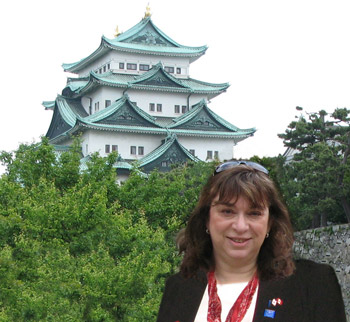TORONTO — It was a “privilege beyond privilege” to exchange knowledge about palliative care with Japanese specialists while on a recent trip to that country, says Rabbi Rena Arshinoff.
She was part of a team of four Canadians from southern Ontario who travelled to Nagoya for three weeks last spring, sponsored by Rotary International, to study palliative care, learn from each other and share experiences.
She was the only clergy on the three-week trip to Japan, which also included a palliative care physician and two nurses.
“We were welcomed into the hospitals with open arms, and even the patients allowed us into their lives,” she said in an interview.
Rabbi Arshinoff, 60, a Montreal native who is married with three children and one grandchild, was trained as a nurse, and did graduate work in epidemiology. She spent 20 years doing clinical research, until she became interested in working with people.
She got more immersed in Judaism when she was saying Kaddish for her father and had a bat mitzvah at age 48. She eventually entered Hebrew Union College, Jewish Institute of Religion, and was ordained in 2008.
Currently, she combines her interest in health care and rabbinics as a chaplain at Toronto Western Hospital in its neuroscience program, and she is pursuing a doctoral degree in palliative care from Lancaster University in England.
Rabbi Arshinoff is only the second rabbi in Canada to receive the credential of specialist in pastoral care from the Canadian Association for Spiritual Care.
She became interested in the field of palliative care, she said, because it makes up part of her main interests – grief, healing, rabbinics and chaplaincy.
“When I was approached by Rotary International to take part in the Japanese program, I immediately became excited. I was being given the opportunity of a lifetime. The Japanese delegation spent three weeks with us here, and we returned to Japan with them,” she said.
She said the standards of medical care in Japan are comparable to North America’s, but spiritual care is lacking.
“Japanese culture does not allow people to talk freely about death, dying and terminal illness,” she said.
“Japan has state of the art machinery, CT scanners, MRI machines, radiation equipment, and advanced medical training, [but] what they lack and desperately want to learn is how to provide holistic and spiritual care to patients, their families, and health-care staff.
“They are aware that the spiritual component of health-care delivery is lacking in their model, and they want to learn from us. [Hearing this] was a affirmation of the work that I do.”
Rabbi Arshinoff said that at each hospital the team visited, they were asked about spiritual support for nurses. “It was the first time that anyone ever had permission to talk about these issues.”
In the west, we are more open and direct, “but not everyone is able to have these conversations easily. Immersing myself in Japanese culture taught me about palliative care there and here,” she said.
“Palliative care is a set of principles, which help provide people with dignity and the ability to make decisions. Professionals provide a wide range of support for people living with illness.
“It provides patients with the ability to plan their life the way they want to live. People can have a beautiful death, and we can help make it beautiful.
“We share the passion to help people, and we want them to have dignity and control. Illness has a way of taking control of people, and we like to be the masters of our own destiny.”
In a dvar Torah she recently delivered at Congregation Darchei Noam, Rabbi Arshinoff said it’s incumbent upon each of us to learn about other cultures if we are to understand the context in which people function.
“Sometimes there seems to be no words that offer comfort, and sometimes we don’t know how to offer what words do exist. But we don’t always need to offer words – we need to offer our presence. Even in silence, our presence speaks words.”
